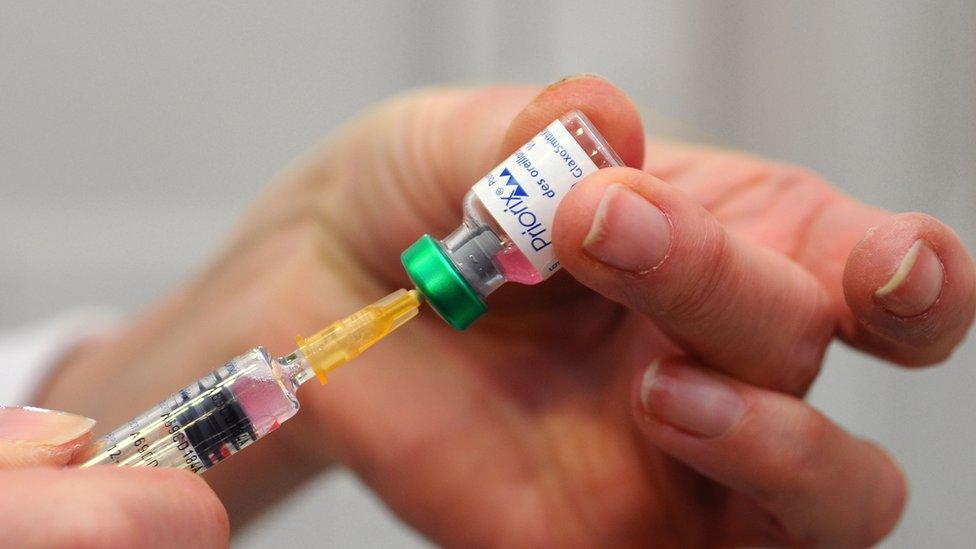Vaccines: Do they wear out? And other questions answered
- Published
How vaccines and herd immunity works
Vaccines have saved tens of millions of lives in the past century, yet a huge worldwide study revealed there is a growing hesitancy against vaccination.
Experts warn public mistrust of vaccines means the world is taking a step backwards in the fight against preventable infectious diseases, and a study by the World Health Organisation, the biggest global study into people's attitudes on immunisation, shows trust is worryingly low in some regions.
The BBC World Service has been looking at the issue across the globe in three days of special coverage.
Prof Beate Kampmann, director of the Vaccine Centre at London School of Hygiene and Tropical Medicine, answers questions about vaccinations sent in by readers of BBC News, following a Facebook Live question-and-answer session on Wednesday.
Allow Facebook content?
This article contains content provided by Facebook. We ask for your permission before anything is loaded, as they may be using cookies and other technologies. You may want to read Meta’s Facebook cookie policy, external and privacy policy, external before accepting. To view this content choose ‘accept and continue’.
Diane: How do you inform the misinformed?
There is no easy answer. The problem is the misinformed tend to communicate with each other and perpetuate the misinformation.
There is a lot of objective vaccine information available from Public Health England, for example, which can be accessed via their website. Vaccine centres - like ours at the London School, or the one at the University of Oxford - will also have spaces for people to look up information which has been put there by scientists.

Threlsar: Is there any standard vaccination to prevent tuberculosis?
The only vaccine in use is BCG and it works, but not well enough. We are trying very hard to make a better one but it's taking time.
Sharena: Is there any vaccine for dengue fever?
Yes, but it cannot be given to very young children.
Asmah: Is the HPV vaccine only effective for young women who aren't sexually active?
Ideally the vaccine should prevent infection with the human papilloma viruses, and that is best done before women - or men- become sexually active. This is the priority of the HPV vaccination program right now.
Myrddin: Do children get more jabs in America?
You mean in comparison to the UK? No, the same vaccines are recommended as in many other countries.
Sometimes the preparations vary but essentially the vaccines work against the same diseases.
If you compare with some other, less resourceful countries then, yes, kids in the USA will get more vaccines than kids in, let's say, Liberia.

Marjolein: Why does the NHS not recommend vaccination for adults who are unvaccinated unless they are travelling to an area with an outbreak?
In the context of the measles outbreak actually it has been recommended that anyone who has not had two doses of the vaccine should get vaccinated, no matter what their age.
Yvonne: Why do they insist on mixing all the vaccines together? And how much research has gone into the long term effects of mixing three or four vaccines together?
The idea of mixing the vaccines together is to prevent too many injections. Each time vaccines are combined they need to be tested to check they do not interfere with each other and all remains safe and effective. Only then are the combination vaccines licensed.
People worry about "overload" but this isn't an issue - just by going out onto the London tube we are exposed to thousands of germs every day.
Even if a child was given 10 vaccines at once, it would only use about a thousandth of their immune system.
Jean: Why can't we give separate vaccines for measles, mumps and rubella? Surely that would alleviate some parental concerns and increase uptake of vaccination?
It makes no sense as far as the body's immune response is concerned, and it requires multiple injections- not too nice for the kids. There really is no need to split these components - the combination is safe and effective and we need to put this issue to bed.
Somali mothers in an MMR vaccine outreach session
Jack: Why do you think people are so afraid of vaccines? Who could possibly benefit?
I think their insights into the serious consequences of diseases have reduced so much because we do not see them anymore in countries where vaccines have been regularly used for a long time. Hence, people only see they might have a sore arm or a bit of a fever but cannot compare that against the experience of the "real" disease.
It would be a shame to have to wait until the diseases are back to convince people vaccines actually work and have already saved countless lives.
Jim: Do vaccines work as well for older people?
As we age so do our immune systems and the memory, not just in the brain! Hence, we sometimes do not respond to vaccines - or infections - in the same way as when we were young.
We are doing research to see how we can best optimise the vaccines for the elderly, as they also need protection, and be effective at any stage of life.
Kam: Why isn't it a legal requirement for vaccines to be given?
It is in some countries but in the UK it is not mandatory as we believe the evidence is so good that people should be persuaded.
There might be situations where that has to change but for now it would be good to win the argument through persuasion.
Maggy: Why isn't it mandatory for children to be vaccinated before attending any schooling?
Not in the UK - it is in the US, Australia, currently in Italy also- it's a bit of a moving field
Inside Italy's war over vaccines
Jaafar: What safety guides do companies follow in making these vaccines? And how do we know that said company is a reliable company?
In order to gain licensure, international regulatory authorities such as the FDA (USA) and the EMA (Europe) have to approve the product - this can only happen when the international safety standards are met.
Alvin: Does the vaccine wear out? And are the vaccines properly tested?
Vaccines have to conform to international safety standards. Their production is monitored and the clinical trials before they can get a license are done to international so-called good clinical practice.
Vaccines have a sell-by date for a specific batch that was made in the factory and need to be used before that's come up.
Protection can wear out for some vaccines, which is why we often need so called "boosters" to refresh the memory of the immune system and generate more antibodies. How many doses are needed throughout life depends on the type of vaccine.
- Published20 June 2019

- Published19 June 2019
